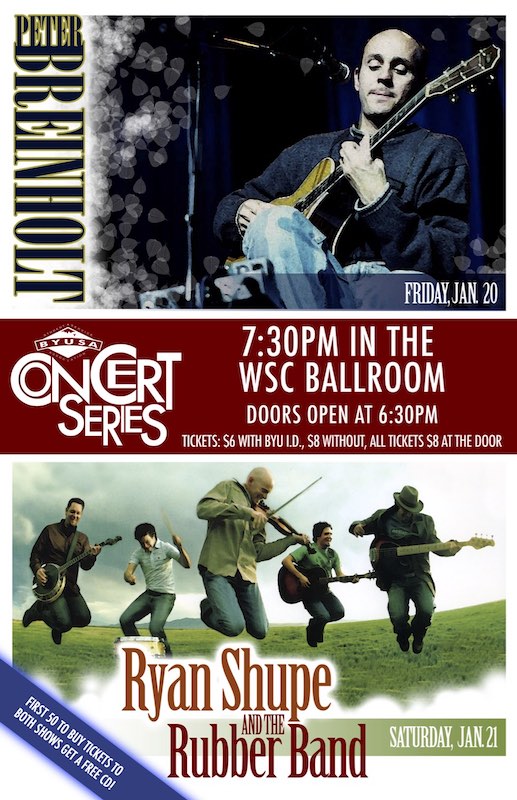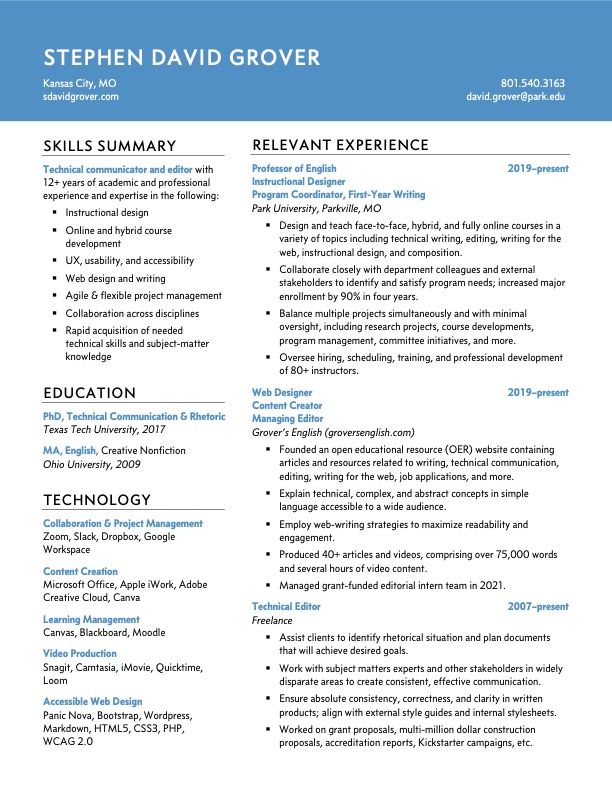
Unsplash
Curriculum Vita
You can view my curriculum vita and resumé by clicking the images below, or scroll down to see my CV in webtext form (with useful links and additional details).
Use the following links to skip to any section.
Education
PhD in Technical Communication and Rhetoric
Texas Tech University
2017
Dissertation Selected Coursework
Preparing Graduate Teaching Assistants to Teach Writing Online:
A Nationwide Assessment of Research and Practice
Committee
Kelli Cargile Cook, chair
Susan Lang
Rebecca Rickly
Abstract
In the absence of any widespread assessment to determine how much and what kind of online writing instruction (OWI)-focused teacher preparation is being offered to graduate teaching assistants, this dissertation presents the results of an empirical, mixed-methods study that maps the field’s current research and practice and then interrogates that map to identify paths for better meeting the needs of the field’s stakeholders. The study’s first phase employs a content analysis of the professional literature and finds that research into OWI preparation is minimal and dominated by too few voices, while the second phase reports on the results of an online questionnaire focused on local OWI preparation program practice and finds that OWI preparation is only sparsely practiced nationwide. The final phase synthesizes these results and provides WPAs a heuristic for the design and evaluation of OWI preparation programs.
Selected Coursework
- Technical Editing
- Writing Program Assessment
- Research Methods
- Instructional Development and Design
- Accessible Rhetoric: Web Accessibility and Disability Studies
- Rhetoric of Scientific Literature
- Teacher Training
MA in English
Creative nonfiction emphasis
Ohio University
2009
Journey to the East: Essays
Committee
Dinty Moore, chair
Janis Holm
Nicole Reynolds
Abstract
This thesis is a collection of seven personal essays written by the author and headed by a critical introduction. The introduction presents a common theme among the essays—that they represent a “journey to the East”—and points out the function of memory in the essays and the necessity for some distance between the speaker and the protagonist in each, even though those two may in fact be the same person. Such distance, the author claims, allows valuable discoveries to be made and justifies an otherwise purely egotistical venture. The introduction also expresses the author’s desire that his essays promote empathy—between author and reader, between reader and the world, and between the reader and the reader’s self.
BA in English, with honors
Minor in Korean
Brigham Young University
2007
To Point B: Essays
Advisor
Patrick Madden
Abstract
This capstone project is a collection of five personal essays prefaced by a critical introduction. The introduction analyzes the nature of the essay as record of the writer’s thoughts and explorations in a given topic or memory. It points out that in an essay, as in life, the end of the journey is rarely known at the outset. Additionally, the introduction records the actual writing of this project, the difficulties and successes experienced by the writer. The essays themselves are on a variety of topics, as evidenced by the titles.
Publications
Peer-Reviewed Publications
Enabling Instructor Presence for Non-Designer Instructors: Using Page-Level Course Design to Improve Student Satisfaction and Success
Quarterly Review of Distance Education 25(2)
Learning to Incorporate Source Material with a Full Menu of Options: Developing a Discrete Skill in Isolation
Writing Spaces: Readings on Writing, Activities & Assignments Archive
Immersion, Reflection, Failure: Teaching Graduate Students to Teach Writing Online
Technical Communication Quarterly, 26(3), 242–255, 2017
The Bedford Bibliography of Research in Online Writing Instruction
Bedford/St. Martin’s online resource, 2017
Bridges of Friendship: The Richard L. Evans Chair for Religious Understanding
The Religious Educator, 9(2), 61–72, 2008
Open Educational Resources
Grover's English
Grover's English is a repository of articles and resources related to writing instruction as well as general student advice, composed primarily with university students in mind. As of Fall 2024, the site contains over 40 articles and videos, comprising over 75,000 words and several hours of video content.
Creative Writing
Other
The Journalism Continuum
Interview with Scott Russell Sanders
River Teeth, 9(1), 87–98, 2007
Presentations
Academic Conference Presentations
Beyond Simple Compliance: Using Design Principles to Enable NDIs to Establish an Authentic Instructor Presence
ATTW Annual Conference, online, 2023
The Two-Thirds Slump: Helping Students Regain Hope by Reframing Their Expectations
CCCC Annual Convention, Chicago, IL, 2023
No More Kids’ Menu: Helping Students Realistically Incorporate Source Material
#working: Using Slack to Extend the Online Classroom and Increase Accessible Interactions
Teacher 2 Teacher presentation (cancelled due to COVID)
Good Guys, Not Goblins: Teaching Multiple Documentation Styles for Greater Understanding
Ethos in Cook’s Illustrated: An Examination of Rhetoric in Recipe Writing
The Current Event Coverage Report: A Synthesis Assignment
At the Crossroads: How We Prepare Graduate Students to Teach Writing Online
Preparing Graduate Students for Excellence in the Online Classroom: A Heuristic for Augmenting Existing Teacher Preparation
How and How Much? The Need for Online Writing Instruction Preparation for Graduate Teaching Assistants
Choose Your Own Adventure: Agency as Constitutive Rhetorical Vision in Web 2.0
NonfictionWow: An Audience-Participation Game Show
NonfictioNow, Iowa City, IA, 2010
The Long and Short Of It: The Evolving Shapes of Creative Nonfiction
Workshops, Seminars, & Public Presentations
Just-in-Time Professional Development for Online Adjuncts
Beyond the Discussion Board
Using Course Design to Enable Instructor Presence for Non-Designer Instructors
Blurring the Edges: Using Slack to Enable and Extend Class Interactions
I Know What Not to Do But Not How to Do It: Teaching Source Incorporation to Help Students Avoid Plagiarism
Professional Development Workshop, Park University, Parkville, MO, 2022
Lock and Key: Resumes for Work and College
Deep Dives Program, Notre Dame de Sion High School, Kansas City, MO, 2022
Designing an Online Course: Pedagogical Principles to Guide Your Actions
Angles of Deflection, Degrees Of Separation: Toward More Natural Interactions in Hybrid Classrooms
“They seek him here, they seek him there—those Frenchies seek him everywhere": Superheroes, Fops, and Secret Disguises in Baroness Orczy's The Scarlet Pimpernel
Madison County Library, Rexburg, ID, 2019
The Current Event Coverage Report: A Synthesis Assignment
Understanding Graduate School Options in Literature, Rhetoric and Composition, Technical Communication, and Creative Writing
Pre-Professional Conference, BYU–Idaho, Rexburg, ID, 2016
Former Graduate Student Q&A
Pre-Professional Conference, BYU–Idaho, Rexburg, ID, 2009
Grad School Q&A
Author Readings
English Department Faculty Reading Series
Dogwood Bloom Reading Series
English Department Reading Series
Teaching Experience
Park University
Assistant Professor: 2019–present
- English 105: Critical Reading, Writing, and Thinking Across Contexts
- English 106: Academic Research and Writing
- English 204: Writing for Online Environments
- English 205: Introduction to English Studies
- English 207: Professional and Technical Editing
- English 304: Special Topics in Writing and Rhetoric
- English 306A: Scientific and Technical Writing
- English 306B: Business Communication
- English 307: Professional Writing in English Studies
- English 384: Professional Experience in English
- English 485: Senior Portfolio
- English 490: Capstone Seminar
- Lib Ed 100: First-Year Seminar
Brigham Young University–Idaho
Adjunct Instructor: 2009–2010, 2015–present
Online Adjunct Instructor: 2010–2014
- Foundations of English 101: Writing and Reasoning
- Foundations of English 301: Advanced Writing and Critical Reading
- English 252: Fundamentals of Research and Presentation
Texas Tech University
Full-time Lecturer: 2010–2011
Graduate Part-time Instructor: 2012–2014
Online Adjunct: 2015–2017
- English 1301: Essentials of College Rhetoric
- English 1302: Advanced College Rhetoric
- English 2311: Introduction to Technical Writing
Ohio University
Graduate Teaching Assistant: 2007–2009
- English 151: Writing and Rhetoric I
- English 308J: Writing and Rhetoric II
Academic Service
Service to the Field
CCCC Online Writing Instruction Standing Group, member
Peer Review Board, InSight: A Journal of Scholarly Teaching
AP English and Composition Language Exam, reader
Association of Mormon Letters Awards, creative nonfiction judge
Service to the University
Park University
Title IX, Investigator
Program Coordinator: First-Year Writing
Liberal Education Subcommittee, member (3 terms)
Course Developer, various courses
Student Persistence and Completion Committee, member
Professional and Technical Writing Course Coordinator
Independent Pathway Development Review Team, member
Independent Pathway Development Review Team, member
Ad Hoc Senate Committee for LE Reform, member
Social Media Coordinator, Department of English and Modern Languages
Rapid Summer Development Faculty Review Team, member
“Blended Learning: Preparing for Fall and Beyond,” faculty seminar organizer
Brigham Young University–Idaho
Book History Field Trip, organizer
Visiting author David Wanczyk reading and class visits, organizer
Jane Austen Yule Ball, contributor
Foundations of English 301 Assessment Committee, member
Service to the Community
Editor (pro bono), job and school applications
Additional Relevant Experience
(Click for details)
Freelance Technical Editor, 2011–present
As a freelance technical editor, I've worked on some major projects including dissertations in accounting and linguistics, an NIH grant proposal, and a proposal for a $30M construction project to benefit a remote Alaskan community endangered by global warming. I'm currently working with a tabletop game company on ensuring the instructions and materials for their upcoming release are clear and correct. As a self-employed technical editor, I engage in the following activities:
- I work with my clients to set clear expectations of the proposed work, timeline, and payment, agreed upon in a carefully worded editing agreement. I use the concept of levels of editing both to communicate with the client about what needs to be done and to save the client time and money.
- I provide consistent updates of my progress and involve the client in editing decisions, and I compile a stylesheet for each job to ensure consistency and to save the client time on future projects.
- I keep a detailed work record to show the client exactly what I'm doing and when.
In addition to the standard tasks of substantive editing, copyediting, and proofreading, I have taken on jobs that call for expertise in document design, so I have become skilled at Adobe InDesign and have developed as a typographer and visual designer.
Visit my freelance editing website, Grover’s Editing, for more details.
Tutor, Texas Tech University Writing Center, 2011–2012
During my doctoral program I spent several semesters working as a tutor at the University Writing Center (UWC). Under Kathy Gillis's leadership, the UWC specializes in working with EFL students, an important mission since TTU has been designated as a Hispanic-Serving Institution and attracts many international students to its petroleum engineering program, among others. As a tutor, I developed my skills working one-on-one with both undergraduate and graduate students and their writing — a great counterpoint to working collectively with students in a classroom. Additionally, I received training in and gained experience with online tutoring.
Managing Editor, Brevity: A Journal of Concise Literary Nonfiction, 2008–2010
As a master's student, I worked as the managing editor of Brevity: A Journal of Concise Literary Nonfiction, one of the best known literary magazines devoted to creative nonfiction. Founded by Dinty W. Moore, Brevity has weathered the turbulent literary publishing scene for nearly two decades. As managing editor, I oversaw the submission and acceptance process, and I also worked with accepted authors to hone their brief essays for publication. I also presented on my experience and insight as an editor at the 2010 AWP Conference in Denver.
Editor, BYU Religious Studies Center, 2006–2007
As an undergraduate, I completed an internship with and then continued to work for the Religious Studies Center, the publishing arm of BYU's School of Religious Education, where I became familiar with scholarly editing, professional printing, and group editorial processes. I worked as part of a team of copy editors, typesetters, research assistants, and senior editors as we guided manuscripts from acceptance and review to fact-checking, editing for clarity, and proofreading and on through typesetting, galley-proofing, and publication. During my time with the RSC, I worked on monographs, anthologies, scholarly editions of historical texts, and an academic journal, The Religious Educator. I was even asked to research and write an article for the journal detailing the history of an endowed chair at the university, noted above under Publications.
Writing Fellow (peer mentor), Brigham Young University, 2005–2007
The BYU Writing Fellows program promotes writing across the curriculum and writing in the disciplines by pairing peer mentors with students in courses that are typically not writing intensive and by working with the instructors of those courses to design better writing assignments and assessments. As a fellow, I peer mentored thirteen to sixteen students each semester on two major writing assignments each. For each assignment, that included written feedback to each student's first draft and a subsequent 20-minute face-to-face meeting to discuss further revisions. As a senior fellow, I also coordinated my team's interaction with the course instructor and worked closely with program administrators to fulfill the objectives of the program. Additionally, I researched and delivered presentations on peer mentoring-related topics during regular program workshops.
Program Manager, BYU Student Association, 2004–2006
As the concert series program manager for two years, I was responsible for overseeing the organization and production of two major on-campus concerts, each one a two-night event with multiple artists. I volunteered hundreds of hours of my time to ensure the success of the events by completing the following:
- Each year, I recruited, trained, and coordinated a small team of assistant program managers who in turn were responsible for coordinating dozens of student volunteers leading up to and on the days of the events.
- I worked with campus offices and officials to secure permissions, venues, and artist accommodations.
- I personally liaised with the professional musicians and their agents, managing the negotiations and signing of their contracts.
- With my assistant program manager for publicity, I oversaw campus-wide advertising campaigns that involved posters, flyers, and promotions.
- I was personally responsible and had to account for the use of over $24,000 of school funds.
When I took on the position, the yearly concert was a one-off, but my team's goal was to prove that a concert series was financially and practically possible. In addition to planning our events, we kept detailed records and put in place protocols that would enable future organizers to save time and effort. We were successful in creating an ongoing concert series of several shows each year.

Eagle Scout, Boy Scouts of America, 1995
As a teenager I was involved with Boy Scouts and earned the rank of Eagle Scout. Over seven years of activity I performed hundreds of hours of service projects and took on various leadership positions. I also completed week-long specialized leadership training camps — Junior Leader Training Conference (JLTC) at the regional level and National Junior Leader Instructor Camp (NJLIC) at the national level — and later twice staffed my region's JLTC. As an adult I spend a year as an assistant scout master.
Honors and Awards
- Mary Barlow Endowed Professor of English Language & Literature, 2025–present
- Park University Faculty Newcomer of the Year Award, 2015
- Helen DeVitt Jones Part-Time Graduate Fellowship, 2015
- Charlotte and Eugene England Personal Essay Contest, honorable mention, 2009
- Intro Journal Award, AWP 2006
- Robert Thomas Honors Scholarship, 2006
- Elsie C. Carroll Informal Essay Contest, first place, 2006
- Edwin M. and Dessie W. Thomas Award for Excellence, 2006
- BYU ORCA Mentoring Grant, 2005
- BYU Honors Program Scholarship, 2005
- Robert K. Franklin Scholarship, 2005–2006
- George H. Brimhall Essay Contest, second place, 2005
- BYU Korean Speech Contest, first place, 2004
Fellowships
Faculty Center for Innovation Scholarship Fellow
Grants
Faculty Development Endowed Funds Grant, Park University, 2024
Amount: $650
Curricular Exploration Grant, Park University Faculty Center for Innovation, 2024
Amount: $1,000
Faculty Development Endowed Funds Grant, Park University, 2021
Amount: $4,068.85
Faculty Development Endowed Funds Grant, Park University, 2019
Amount: $712.44
Professional Affiliations
- ACES: The Society for Editing
- Association of Teachers of Technical Writing
- Conference on College Composition and Communication
- Council of Writing Program Administrators
- Global Society of Online Literacy Educators

